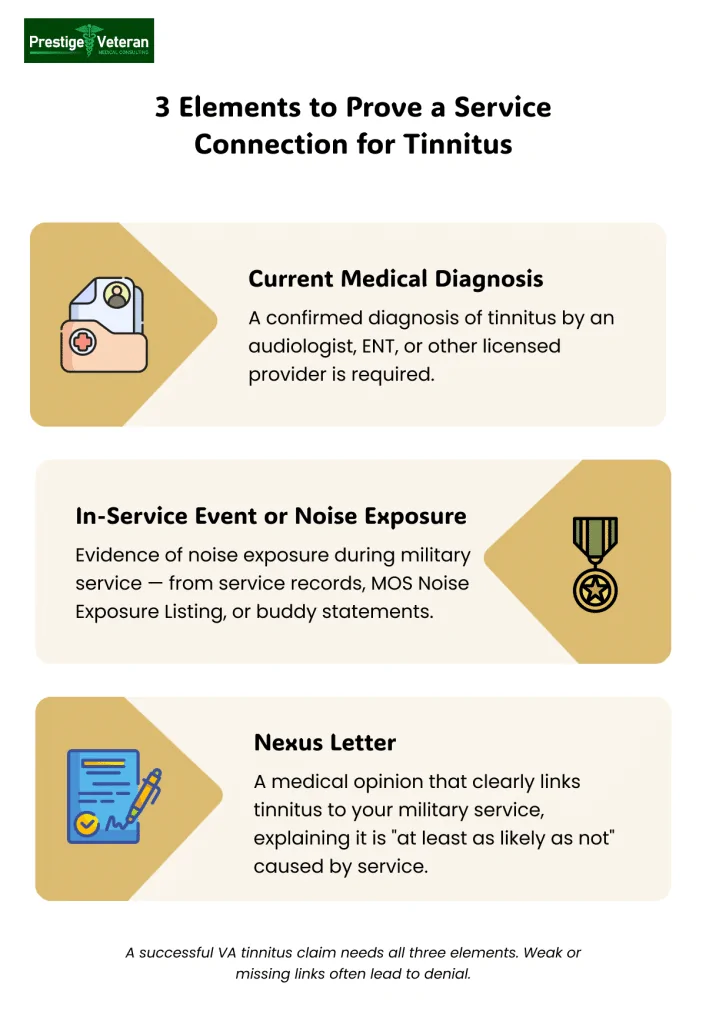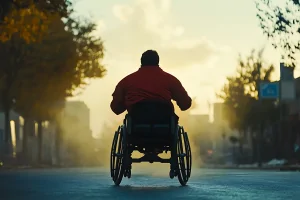Last Updated on 5 August, 2025
According to the Fiscal Year 2024 Annual Benefits Report, tinnitus is the most prevalent service-connected disability among all compensation recipients, affecting 3,255,323 veterans, which is nearly 63.9% of auditory disabilities. Yet despite its prevalence, many VA claims for tinnitus are denied, leaving veterans feeling frustrated and confused about how to move forward.
The process of filing a claim with the Department of Veterans Affairs (VA) can be complex, requiring specific evidence and documentation to prove service connection. This guide will help you understand why some tinnitus claims get denied, provide practical tips to strengthen your appeal, and offer resources to consider if your VA claim is rejected.
Table of Contents
Tinnitus and Veterans
Tinnitus, or ringing in the ears, is a common condition among veterans, often described as a persistent ringing, buzzing, or hissing sound in the ears. Nearly 30% of military veterans experience tinnitus.
Some of the military causes of tinnitus are:
- Prolonged exposure to loud noises
- Head and neck injuries
- Ear infections
- Temporomandibular joint disorder (TMJ)
- Ménière’s disease
- High blood pressure
- Other trauma experienced during military service
The VA’s Official Duty MOS Noise Exposure Listing categorizes military jobs by noise exposure risk (e.g., “highly probable” for infantry, artillery, and aircraft crew), allowing veterans in high- or moderate-risk roles to be presumed exposed, thereby facilitating claims for tinnitus and hearing loss.
How the VA Rates Tinnitus Claims
The VA rates tinnitus under Diagnostic Code 6260 (38 CFR § 4.87 – Schedule of ratings—ear). Under this regulation, recurrent tinnitus has a maximum schedular rating of 10%, and only a single 10% rating is assigned, whether the condition affects one ear (unilateral) or both ears (bilateral).
Tinnitus manifests in different forms, including,
- Subjective tinnitus (heard only by the person affected), or
- Objective tinnitus (caused by physical internal sources, though this is rare).
Tinnitus symptoms can range from mild to severe hearing loss, often disrupting daily activities such as sleeping, resting, concentrating, and overall quality of life. The NOISE Study found that 53% of participating veterans reported tinnitus, with higher rates among those with longer service and greater exposure to noise, blasts, or traumatic brain injury (TBI).
Managing and Treating Tinnitus
Treatment options for tinnitus include white noise machines, hearing aids, counseling, and stress management techniques to manage symptoms. Filing a successful VA disability claim for tinnitus requires thorough documentation of its service connection and impact on daily life to ensure veterans secure the VA benefits they deserve.
Common Reasons VA Denies Tinnitus Claims
The VA’s strict approval criteria for tinnitus claims often result in frustration for veterans. So how is a VA claim for tinnitus denied? Below are the key reasons for tinnitus claim rejection, along with information on common pitfalls:
1. Lack of Medical Evidence
A successful tinnitus claim requires clear medical evidence, including a formal diagnosis and documentation linking the condition to military service. Claims without current medical records, service treatment records, hearing tests by audiologists (speech recognition test and pure tone audiogram), or a credible nexus are often dismissed.
Additionally, a detailed evaluation of military noise exposure can help support the connection. Veterans who are successful often ensure their claim is supported by up-to-date medical documentation, detailing their symptoms and diagnosis.
2. Insufficient Service Connection
To approve a claim, the VA must establish a direct link between tinnitus and military service. This often involves evidence of exposure to loud noise, such as gunfire, explosions, aircraft, or machinery.
Veterans whose military occupational specialty (MOS) does not inherently involve noise exposure consider providing additional evidence, such as buddy statements or service records, to strengthen the connection. Failure to demonstrate this link can result in tinnitus VA claim denial.
3. Weak or Missing Nexus Statement
Establishing a nexus is critical to obtaining disability for tinnitus related to military service. A nexus can be established at the VA C&P in many cases. While a narrative nexus letter is never required, it may benefit some veterans depending on their circumstances.
This document, authored by a medical professional familiar with the veteran’s service and medical history, should clearly explain how noise exposure during service caused or aggravated the condition.
Generic or vague nexus statements are often insufficient, and disability claims without this connection are denied.
4. Missing or Incomplete Documentation
Incomplete or improperly completed forms, such as VA Form 21-526EZ, can lead to immediate tinnitus claim denials. Veterans must ensure all required paperwork is accurately filled out and supported by relevant evidence, including medical records and service documentation.
Veterans who are unfamiliar with completing these documents should follow up with an accredited legal professional like a Veterans Service Organization (VSO), accredited claims agent, or an attorney.
5. Failure to Attend Compensation and Pension (C&P) Exams
The Compensation and Pension (C&P) exam is a crucial step in the tinnitus claims process, allowing the VA to evaluate the severity of the condition. Missing the exam or providing incomplete or unclear symptom descriptions can result in denial. Veterans should attend these exams prepared to discuss the frequency, severity, and impact of their tinnitus in detail.
6. Errors by the VA Examiner
Even when veterans attend their C&P exams, mistakes made by the examiner can harm their claim. Errors such as dismissing credible evidence, misreporting symptoms, or conducting an incomplete assessment can lead to denials. Veterans suspecting errors often request a copy of the exam report and appeal the findings if necessary, often with the assistance of accredited legal professionals.
7. Pre-Existing Conditions
Military tinnitus claims may be denied if the VA determines that tinnitus existed before service and was not worsened due to military service or is unrelated to military activities. Veterans often address any pre-existing conditions in their application as indicated and focus on demonstrating how military service caused or worsened their tinnitus.
8. Discharge Status Issues
Veterans with dishonorable discharges are often ineligible for VA disability benefits. Additionally, claims may face increased scrutiny if the discharge status raises questions about eligibility. Veterans should confirm their eligibility based on their discharge classification and consult with legal professionals as needed.
9. Filing Errors or Inconsistent Evidence
Errors in filing or inconsistencies in the evidence provided, such as discrepancies in service records, medical documentation, or personal statements, can undermine a claim. The VA evaluates both the credibility of the veteran’s statements and the consistency of the submitted evidence. Veterans should review their claims thoroughly and address any potential inconsistencies.
By addressing these denial reasons, veterans can demonstrate a strong service connection and improve their chances of receiving approval for tinnitus claims.
Steps to Take After a Tinnitus Claim Denial
A denial of your tinnitus claim can feel discouraging, but it doesn’t mean your case is over. Many veterans consider the appeals process. Usually, VSOs offer assistance at no charge and other claims professionals like accredited agents and attorneys are available and generally have no upfront costs. Some considerations include:
1. Understand the VA’s Decision
Carefully review the VA denial letter to identify specific reasons for the rejection. This could include missing evidence, insufficient medical documentation, or doubts about the service connection. Pinpointing these issues helps you address weaknesses in your case during the appeal process.
2. Consider Your Options to Include Your Ability to File an Appeal
Choose the most appropriate appeal pathway based on your circumstances. VA.gov outlines the following options under the Appeals Modernization Act:
- Higher-Level Review: Request a senior VA officer to re-evaluate your claim if you believe an error was made.
- Supplemental Claim: Submit new and relevant evidence, such as a nexus letter or updated medical reports, to support your case.
- Board of Veterans’ Appeals: Escalate your claim for a formal review, which may involve hearings or the submission of additional evidence.
Act quickly, as each appeal option has specific deadlines.
3. Seek Professional Assistance
Navigating the appeals process can be complex. Consider enlisting the help of a Veterans Service Organization (VSO), VA-certified agent, or accredited attorney. These professionals can:
- Review why your VA claim for tinnitus got denied
- Gather additional evidence like buddy statements or nexus letters
- Provide representation during the Board of Veterans’ appeals, increasing your likelihood of success
With these solutions, veterans can turn a denial into an approval.
How to Prove a Service Connection for Tinnitus
Tinnitus affects nearly 15% of American adults and is the most common service-connected disability among Veterans. For a tinnitus claim to be successful, veterans are required to satisfy three key elements:

1. Current Diagnosis
A formal diagnosis of tinnitus is essential. Veterans should ensure their medical records explicitly state the condition and include detailed accounts of symptoms. Many Veterans are able to obtain a diagnosis at the C&P exam or have the diagnosis confirmed, depending on the circumstances.
2. Evidence of an In-Service Event
This could be a documented incident, such as exposure to gunfire or explosions, that caused or worsened tinnitus. Veterans often use service records, military assignments, and buddy statements to corroborate their tinnitus claims.
3. Nexus Letter
A nexus letter can be important medical evidence for a tinnitus VA disability claim, linking the condition to military service. It often details in-service noise exposure, medical history, and provides a professional opinion meeting the “as likely as not” standard. This evidence strengthens the claim in many cases, making it more likely to receive VA approval.
It is important to note that there are many variables that are considered in a VA claim, and that a nexus letter is only one element. If the letter is inaccurate or does not contain supporting evidence, it may not have much probative value.
Secondary Conditions That Increase Your Tinnitus VA Rating
Although the VA tinnitus rating caps at 10%, you can maximize your total disability rating by claiming secondary conditions caused or worsened by tinnitus. Under 38 CFR § 3.310, establishing a secondary service connection requires medical evidence linking the primary service‑connected condition (tinnitus) to another condition, such as:
- Sleep Apnea – Tinnitus-related insomnia or sleep disruption can lead to obstructive sleep apnea.
- Migraines – Ringing in the ears may trigger frequent, prostrating, or chronic migraine headaches.
- Mental Health Disorders – Tinnitus worsens anxiety, depression, and PTSD, causing mood swings, panic, and insomnia.
- Temporomandibular Joint Disorder (TMJ) – Jaw tension or misalignment is often linked to or worsens tinnitus.
- Bruxism (Teeth Grinding) – Involuntary teeth grinding, especially at night, associated with tinnitus stress.
- Chronic Fatigue – Poor sleep and mental strain from tinnitus result in persistent exhaustion.
- Hearing Loss – Often coexists with tinnitus; may qualify for a separate VA rating.
- Traumatic Brain Injury (TBI) – Service-related head trauma can directly cause or worsen tinnitus symptoms.
Let’s say a veteran has a 10% tinnitus rating but is experiencing underlying severe sleep apnea worsening that condition. The added rating for sleep apnea (commonly 50% or higher) can substantially increase the total compensation, even potentially leading to a 100% VA rating or Total Disability Individual Unemployability (TDIU) status.
To prove secondary conditions to tinnitus, veterans need:
- An official medical diagnosis
- Nexus letters stating that sleep apnea aggravates tinnitus
- Supporting medical records (VA and private treatment records, sleep studies, ENT evaluations)
- Lay statements (if available) connecting the dots between your primary and secondary conditions
Use VA Form 21-526EZ to file a secondary service-connection claim that could increase your overall disability rating beyond the fixed 10% tinnitus rating.
How to Win a VA Tinnitus Claim: Key Strategies
Given the hurdles in obtaining approval and the high VA tinnitus claim denial rate, veterans often take proactive steps to strengthen their claims or prepare for appeals:
1. Gather Medical Records
Veterans often seek an official diagnosis of tinnitus from a licensed healthcare provider, such as an audiologist or ENT specialist. Medical records often contain a detailed history that describes your symptoms, their impact on daily activities, and their connection to military service.
A nexus letter for tinnitus explicitly linking your symptoms to noise exposure during service can be valuable. Additionally, veterans often document the treatments and therapies they have pursued, as this can demonstrate the condition’s impact on their daily lives.
2. Collect Comprehensive Service Records
Service records for tinnitus VA claims can be vital for establishing noise exposure during your military career.
- Gather deployment orders, duty assignments, training logs, and incident reports to detail your service history.
- Highlight roles or assignments involving high noise exposure, such as artillery, aviation mechanics, or infantry, supported by Military Occupational Specialty (MOS) codes.
- Include buddy statements from fellow service members who can attest to witnessing exposure to loud environments or injuries.
These records and testimonies provide a solid foundation in the VA appeals process for tinnitus.
3. Establish a Service Connection
To win a denied VA claim for tinnitus, veterans need to provide evidence of a specific in-service event that caused or contributed to their tinnitus. Noise exposure in loud environments is a common cause, and records of your duties in such settings may support the link.
Lay evidence, including personal statements and those from colleagues, can verify your tinnitus symptoms, which may further corroborate your claim. This is especially important if your initial tinnitus claim was denied and you are pursuing an appeal for service connection.
4. Consider Using an Accredited Legal Professional to Submit a Complete and Accurate Claim
Filing an accurate tinnitus VA claim is crucial. Many Veterans use accredited VA disability attorneys or Veterans Service Organizations (VSOs), especially if facing a tinnitus claim denial. Veterans also use the easy-to-access VA.gov portal or submit VA Form 21-526EZ by mail or in-person at your local VA Regional Office with all required documentation, including medical records, service records, nexus letters, and lay evidence.
5. Prepare for and Attend the C&P Exam
A C&P exam for Tinnitus determines if you have recurrent Tinnitus, its severity, and how it impacts your daily life. During the tinnitus C&P exam, be prepared to answer questions like:
- When did your tinnitus begin?
- What triggered the ringing in the ears?
- How often does it occur?
- How does your tinnitus impact sleep, concentration, and work?
The examiner may conduct a physical exam and audiometric testing (audiogram and speech recognition). Additionally, the examiner will complete the VA DBQ for Tinnitus.
Don’t focus on how to fail a VA hearing test. Instead, be honest and clearly describe your worst days, as your Compensation and Pension exam is often a key factor in the VA’s decision.
6. Consider Secondary Conditions
Tinnitus is often linked to secondary service-connected conditions, such as hearing loss, depression, migraines, or sleep disorders. Veterans who can link these secondary conditions may qualify for higher combined VA ratings for tinnitus claims.
This strategy can be especially helpful if your initial tinnitus VA claim was denied and you are looking to increase your disability rating through an appeal.
PACT Act & Tinnitus: Linking Exposure to Presumptive Conditions
The PACT Act (Promise to Address Comprehensive Toxics Act), signed in 2022, establishes over 20 new presumptive illnesses related to veterans who served in Vietnam, the Gulf War, and post-9/11 conflicts and were exposed to burn pits, Agent Orange, or other toxic substances. While tinnitus itself isn’t listed as a presumptive condition, the PACT Act increases eligibility for underlying or linked conditions that can make tinnitus compensable.
For example, a Gulf War veteran exposed to airborne toxins who develops a PACT Act‑eligible respiratory disease like sinusitis and resulting tinnitus could file a claim connecting tinnitus as secondary. This means that veterans with documented toxic exposure and secondary conditions may bypass needing to prove direct service causation.
Consult with VA-accredited attorneys or claims agents to accurately review your military exposure history and link symptoms to presumptive conditions. Since tinnitus isn’t directly presumptive under the PACT Act, a nexus opinion letter linking noise exposure or related conditions can be vital evidence.
Hence, filing a presumptive service connection can significantly boost your VA tinnitus claim approval rates and compensation amounts.
New 2025 VA Rating Proposals for Tinnitus Claims
In 2025, the VA has proposed eliminating the separate 10% schedular rating for tinnitus (Diagnostic Code 6260). Under the new rules, tinnitus would only be compensable if it is directly tied to an underlying service‑connected condition, such as non‑compensable (0 %) hearing loss, Meniere’s disease, TBI, or a vascular/neurocognitive disorder.
For example, if a veteran has a 0% rating for hearing loss and also experiences tinnitus related to that hearing loss, they may still qualify for a 10% tinnitus rating under the new Diagnostic Code 6100. However, if hearing loss is rated at 10 % or above, tinnitus would no longer receive an additional rating; instead, its symptoms would simply be folded into the hearing loss evaluation.
Note: Already‑rated veterans are being “grandfathered” under the old system so they retain their benefits, but new claims filed after implementation must meet the stricter criteria.
Veterans should seek assistance from VA-accredited representatives or attorneys to file secondary or underlying conditions with tinnitus claims before the effective date.
If You Disagree with Your VA Tinnitus Claim Decision
If your VA tinnitus claim was denied or you received a lower rating than expected, you can request a decision review instead of starting over. Veterans have three main options:
- Higher-Level Review – A more experienced VA adjudicator re-examines your claim. For example, if you believe that your C&P exam was misinterpreted, you can point that out here.
- Supplemental Claim – Add new and relevant evidence, such as a recent audiologist report confirming constant ringing in your ears or a nexus letter showing your tinnitus started after weapons training.
- Board Appeal – Have your case reviewed by a Veterans Law Judge, with or without a hearing. This is often used when you feel the VA misapplied the law or ignored key medical opinions.
The deadlines for appeals are usually within one year of your VA decision, so don’t wait. Veterans can find success by working with a VSO, accredited agent, or attorney.
Case Studies: Denied Tinnitus VA Claims
Example 1: Former U.S. Air Force Aircraft Mechanic
Angela R., a 42-year-old Air Force veteran, spent six years maintaining jet engines on active flight lines (MOS: 2A6X1), where she faced daily exposure to high-decibel noise. She developed constant high-pitched ringing in both ears, but her initial VA tinnitus claim was denied due to “insufficient evidence.”
With guidance from a VA-accredited attorney, she gathered:
- A nexus letter from an ENT specialist
- Service records verifying occupational noise exposure
- A lay statement from a fellow airman confirming her symptom onset during active duty
- Documentation of her use of white noise therapy and sleep disruptions tied to her tinnitus
Her supplemental claim was approved with a 10% rating, plus an additional 50% for secondary service-connected insomnia.
What Helped Angela:
- Nexus letter from board-certified ENT
- Verified MOS exposure records (2A6X1)
- Lay evidence from a former squad leader
- Documented sleep study and treatment records
“Once I had expert backing and proof, the VA finally listened.” – Angela R.
Example 2: Army National Guard Combat Engineer (Citation Nr: 0904521)
In Citation Nr: 0904521, a Veteran appealed a denial of service connection for tinnitus. He served with the Army National Guard in 2001 and 2003 as a combat engineer and reported constant ringing in his ears due to regular exposure to military service-related loud noises.
Case Highlights:
- A December 2003 audiogram confirmed he was “Routinely Noise Exposed.”
- In June 2005, a VA exam noted that the Veteran denied tinnitus, which he later clarified was a misunderstanding as he thought “tinnitus” referred to hearing loss.
- In October 2005, his claim was denied due to a lack of diagnosis and service treatment records documenting tinnitus.
- During a May 2006 informal hearing, a Decision Review Officer consulted the VA Chief of Audiology, who upheld the tinnitus claim denial without reviewing the file or examining the Veteran.
The Board found this insufficient and remanded the case for a new, thorough VA examination and medical opinion based on a complete review of the claims file.
Source: Board of Veterans’ Appeals Decision, Citation Nr: 0904521, Docket No. 06-09 103, issued February 9, 2009. Available from the U.S. Department of Veterans Affairs archives.
Conclusion
Tinnitus is more than just an annoyance—it can profoundly impact a veteran’s life, causing physical, emotional, and psychological challenges that affect daily activities and overall well-being. Securing proper VA disability benefits is essential to ensuring veterans receive the support they need. By understanding why your VA claim for tinnitus was denied and gathering strong evidence, including addressing any secondary conditions, veterans can build a more compelling case. Leveraging resources like accredited legal professionals and detailed nexus letters can further help them navigate the VA system and secure the compensation they rightfully deserve.
FAQs
Can the VA deny tinnitus claims?
Yes, the VA can deny tinnitus claims if there is insufficient medical evidence, a lack of service connection, missing nexus statements, or incomplete documentation.
How do I prove tinnitus to the VA?
You can prove tinnitus by providing a medical diagnosis and credible evidence (service medical records, nexus letters, and lay statements) linking it to your military service.
How hard is it to get a disability for tinnitus?
Getting disability for tinnitus can be challenging due to strict VA criteria, requiring thorough documentation, credible medical evidence, and clear service connection.
Is tinnitus hard to prove?
Although tinnitus is subjective and not easily measured, a consistent medical history and supportive statements can make it less difficult to prove.
What are 5 conditions secondary to tinnitus?
Five conditions secondary to tinnitus include hearing loss, anxiety, depression, migraines, and sleep disorders.
What is the difference between tinnitus and hearing loss?
Tinnitus is the perception of ringing or noise in the ears without an external source, while hearing loss is the partial or complete inability to hear sounds.
What does a VA tinnitus C&P exam usually involve?
During the VA tinnitus Compensation and Pension (C&P) exam, you’ll be evaluated on the presence, severity, and daily impact of your tinnitus symptoms, often including a physical exam, audiometric testing, and the completion of a VA Disability Benefits Questionnaire (DBQ).
How does the Duty MOS Noise Exposure Listing help my tinnitus VA claim?
The Duty MOS Noise Exposure Listing categorizes military jobs by noise exposure risk, allowing veterans in high- or moderate-risk roles to be presumed exposed, helping establish a service connection for tinnitus.
What is the VA tinnitus rating, and can it be increased?
The VA assigns a maximum tinnitus disability rating of 10%, but you can potentially increase your overall compensation by claiming secondary service-connected conditions like hearing loss, sleep apnea, or mental health issues.
Also read: Tinnitus and Veterans Disability
At Prestige Veteran Medical Consulting, a veteran-owned company, we specialize in Independent Medical Opinions (IMOs) known as Nexus letters.
Our purpose is to empower YOU, the veteran, to take charge of your medical evidence and provide you with valuable educational tools and research to guide you on your journey.
Understanding the unique challenges veterans face, our commitment lies in delivering exceptional service and support.
Leveraging an extensive network of licensed independent medical professionals, all well-versed in the medical professional aspects of the VA claims process, we review the necessary medical evidence to incorporate in our reports related to your VA Disability Claim.
Prestige Veteran Medical Consulting is not a law firm, accredited claims agent, or affiliated with the Veterans Administration or Veterans Services Organizations. However, we are happy to discuss your case with your accredited VA legal professional.















